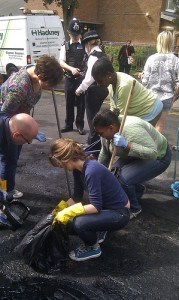
Our Community
“Basically we nearly died!” was my niece Roxana’s Facebook status. It was accompanied by a few seconds of video she’d taken with her phone, showing a group of young men hurling objects and up-ending a car. I heard Roxana’s voice rising in pitch: “They’re going to torch it!”
I watched the video in horror but, I’m afraid to say, took my beloved niece’s “status” with a large pinch of salt… until I heard the full story. She and her friend were in Ealing, suburban West London, when a mob started running down the street. A restaurant owner brought the two young women and a teenage girl into her restaurant and locked the doors to protect them. They ran into the basement just as the teenage boys outside started to smash the plate glass windows. Moments later the mob broke in and starting looting. From the basement my niece and the others heard footsteps, crashing glass, and shouting above them. After an hour or so they escaped to find wine bottles and the cash register smashed on the floor and the chairs missing. A store three doors away had been burnt down.
Initially a response to the fatal police shooting of Londoner Mark Duggan, the riots spread throughout the capital and then throughout the country. During this wave of riots, I’ve observed that those with liberal or center-left views seem more likely than before to see this as individual rather than a societal problem. As a friend said on Facebook, “This was no noble uprising, no call for jobs, a call to end war, etc.; it was sheer hooliganism and criminal behaviour.” Many agreed. We laughed when Margaret Thatcher first told us that there was “no such thing as society,” but maybe her words took root.
Journalist Seamus Milne puts society back in the picture, stating, “If these riots have no social or political causes, then clearly no one in authority can be held responsible.” Other commentators stressed that acknowledging the behaviour as criminal and destructive shouldn’t preclude us from putting it in a context. For example, Gary Younge in his column argued, “These riots were political. The rioters were looting, not shoplifting,” and highlighted the fact that the media and the police have been implicated in “either committing or colluding in a range of systematic criminal acts during the phone-hacking scandal.” Others have pointed out that Members of Parliament, many of whom were asked to repay expenses, are in a poor position to lecture rioters or their parents about greed. One comedian parodied this in an open letter to Prime Minister David Cameron’s parents.
 If we accept that these riots illustrate a lack of trust in politics, policing, and the media, then we need to consider the full range of ways in which people responded to the riots. Yes, some went out, smashed windows and grabbed plasma screens, but in addition to “Facebook rioters,” we also witnessed flash mobs organising to clean up their own communities. Apparently, on the third night of rioting the hashtag #riotcleanup started trending ahead of #londonriots.
If we accept that these riots illustrate a lack of trust in politics, policing, and the media, then we need to consider the full range of ways in which people responded to the riots. Yes, some went out, smashed windows and grabbed plasma screens, but in addition to “Facebook rioters,” we also witnessed flash mobs organising to clean up their own communities. Apparently, on the third night of rioting the hashtag #riotcleanup started trending ahead of #londonriots.
And while appeals for calm from politicians were met with heckling, the dignified appeal by grieving father Tariq Jahan, whose son died along with two friends physically protecting their community, was well received. “Step forward if you want to lose your sons,” he said. No one stepped forward. “Alright,” he continued, “calm down and go home!” Eventually people did go home, but this story is far from over. Like other uprisings from LA to Tahir Square, what happens next is key. Those who want to create a society that doesn’t, to quote another friend, “demonise the poor and celebrate the wealthy,” will not want to leave future solutions in the hands of the politicians but to continue to organise their communities.
Tony Benn, the former Labour Member of Parliament, once said there were five questions to ask people in power:
Now the glass has been swept up, maybe it’s time for people in Britain, and internationally, to start asking some of these questions.
Clare Ramsaran is from London, where she used to work as a Human Rights educator with young people and adults. Currently she works for Tides as an Instructional Designer/Software Trainer.
Photo of police by tgeasland, photo of clean up efforts by Martin Deutsch, both via Flickr (used under Creative Commons license).

Read the stories and hear the voices of social change leaders fighting for justice.